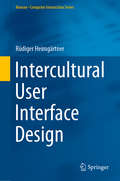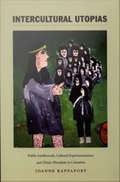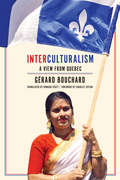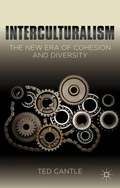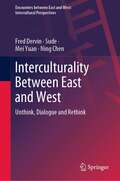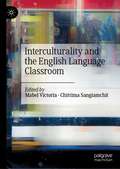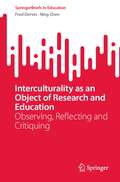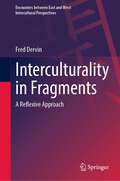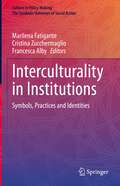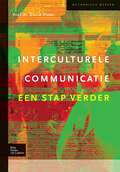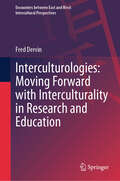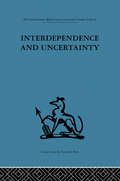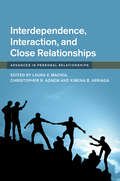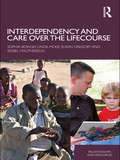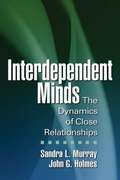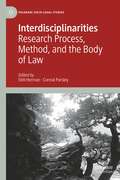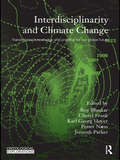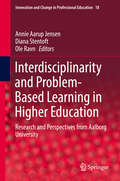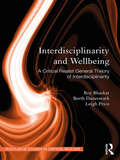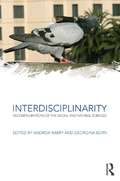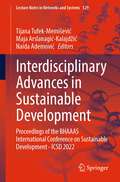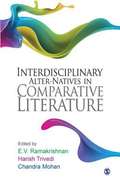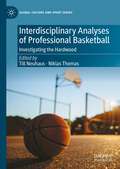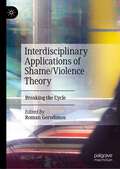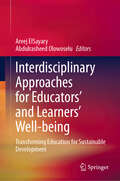- Table View
- List View
Intercultural User Interface Design (Human–Computer Interaction Series)
by Rüdiger HeimgärtnerThe path for developing an internationally usable product with a human-machine interface is described in this textbook, from theory to conception and from design to practical implementation. The most important concepts in the fields of philosophy, communication, culture and Ethnocomputing as the basis of intercultural user interface design are explained. The book presents directly usable and implementable knowledge that is relevant for the processes of internationalization and localization of software. Aspects of software ergonomics, software engineering and human-centered design are presented in an intercultural context; general and concrete recommendations and checklists for immediate use in product design are also provided. Each chapter includes the target message, its motivation and theoretical justification as well as the practical methods to achieve the intended benefit from the respective topic. The book opens with an introduction illuminating the background necessary for taking culture into account in Human Computer Interaction (HCI) design. Definitions of concepts are followed by a historical overview of the importance of taking culture into account in HCI design. Subsequently, the structures, processes, methods, models, and approaches concerning the relationship between culture and HCI design are illustrated to cover the most important questions in practice.
Intercultural Utopias: Public Intellectuals, Cultural Experimentation, and Ethnic Pluralism in Colombia
by Joanne RappaportAlthough only 2 percent of Colombia's population identifies as indigenous, that figure belies the significance of the country's indigenous movement. More than a quarter of the Colombian national territory belongs to indigenous groups, and 80 percent of the country's mineral resources are located in native-owned lands. In this innovative ethnography, Joanne Rappaport draws on research she has conducted in Colombia over the past decade--and particularly on her collaborations with activists--to explore the country's multifaceted indigenous movement, which, after almost 35 years, continues to press for rights to live as indigenous people in a pluralistic society that recognizes them as citizens. Focusing on the intellectuals involved in the movement, Rappaport traces the development of a distinctly indigenous modernity in Latin America--one that defies common stereotypes of separatism or a romantic return to the past. As she reveals, this emerging form of modernity is characterized by interethnic communication and the reframing of selectively appropriated Western research methodologies within indigenous philosophical frameworks. Intercultural Utopias centers on southwestern Colombia's Cauca region, a culturally and linguistically heterogeneous area well known for its history of indigenous mobilization and its pluralist approach to ethnic politics. Rappaport interweaves the stories of individuals with an analysis of the history of the Regional Indigenous Council of Cauca and other indigenous organizations. She presents insights into the movement and the intercultural relationships that characterize it from the varying perspectives of regional indigenous activists, nonindigenous urban intellectuals dedicated to the fight for indigenous rights, anthropologists, local teachers, shamans, and native politicians.
Interculturalism
by Charles Taylor Howard Scott Gerard BouchardAccommodating ethnic diversity is a major challenge for all democratic nations and a topic that has attracted a great deal of attention in the last few decades. Within Quebec, a new approach has emerged that seeks a balance between the needs of minorities and those of the majority.In Interculturalism, sociologist and historian Gérard Bouchard presents his vision of interculturalism as a model for the management of diversity. A pluralist approach which recognizes the existence of a cultural majority whose rights must also be acknowledged, interculturalism constitutes an important alternative to multiculturalism both in Canada and internationally. Written by one of Quebec's leading public intellectuals and the co-chair of the Bouchard-Taylor Commission on reasonable accommodation, Interculturalism is the first clear and comprehensive statement in English of an approach being discussed around the world.A translation of Bouchard's award-winning French-language work, L'Interculturalisme: Un point de vue québécois, this book features a new foreword by philosopher Charles Taylor and an afterword by the author written specifically for the English-language edition.
Interculturalism
by Ted CantleInterculturalism is a new concept for managing community relations in a world defined by globalization and 'superdiversity'. This book argues that as countries become more diverse a new framework of interculturalism is needed to mediate these relationships and that this will require new systems of governance to support it.
Interculturality Between East and West: Unthink, Dialogue and Rethink (Encounters between East and West)
by Fred Dervin Sude Mei Yuan Ning ChenThis book urges readers to develop a radical capacity to unthink and rethink interculturality, through multiple, pluri-perspectival and honest dialogues between the authors, and their students. This book does not give interculturality a normative scaffolding but envisages it differently by identifying some of its polyphonic textures. China’s rich engagement with interculturality serves to support the importance of being curious about other ways of thinking about the notion beyond the ‘West’ only. As such, the issues of culture, identity, language, translation, intercultural competence and silent transformations (amongst others) are re-evaluated in a different light. This is a highly informative and carefully presented book, providing scientific insights for readers with an interest in interculturality.
Interculturality and the English Language Classroom
by Mabel Victoria Chittima SangiamchitThis book examines the concept of interculturality in English Language Teaching (ELT), using examples from diverse international and educational settings to demonstrate different approaches. Increased contact between multilingual speakers from different cultural backgrounds means that linguistic and intercultural competence must be taught hand in hand, and the approaches featured here will: encourage learners to develop intercultural sensitivity and a critical intercultural attitude; mitigate the limitations of textbooks and extend the learning to global issues, intercultural citizenship, and media literacy; show the potential of telecollaboration and popular culture as pedagogical resources; and demonstrate the value of interculturality in English as lingua franca situations and English for Academic Purposes. The chapters feature empirical studies from around the world, and include questions for reflection and recommended reading so that readers can engage more closely with key concepts, compare and adapt the practices most relevant to them. This book contributes to the literature on (inter)cultural pedagogy, English as a lingua franca, language pedagogy, and teacher professional development, and will be an invaluable tool for English language teachers, teacher trainers and educators seeking to enrich their practice. It will also be of interest to students and scholars of Applied Linguistics, especially language education.
Interculturality as an Object of Research and Education: Observing, Reflecting and Critiquing (SpringerBriefs in Education)
by Fred Dervin Ning ChenThis book proposes a new method for working on the complex and polysemic notion of interculturality, aimed at scholars, students and educators who have an interest in enriching and challenging their own take on this somewhat controversial scientific notion. Multiple examples of observability made by the authors are provided to illustrate the method. The book helps readers to look at themselves as ‘producers’, ‘consumers’ and ‘promoters’ of selected knowledge of interculturality. This book represents an original contribution to the field, by introducing the importance of observation and reflexivity in building up varied epistemic engagements with the notion of interculturality.
Interculturality in Fragments: A Reflexive Approach (Encounters between East and West)
by Fred DervinThis book continues the author’s long-term reflections (over 20 years of scholarship and experience in intercultural communication education) around the fascinating and yet contestable notion of interculturality in education. As an unstable and polysemic notion, interculturality deserves to be opened up again and again and there is a need to engage with it continuously, observing, critiquing and problematizing its complexities. This book urges researchers, students and interculturalists to take the time to think carefully and deeply about interculturality and to find inspiration beyond the dominating ‘Western’ ideological world of intercultural research and education. This book starts from short fragments written by the author for himself over a period of one year. In these short statements and notes about interculturality, the author reflects creatively on the questions he had in mind at the time of writing and offers some (temporary) answers, which, in turn, are questioned and revised. Over the 1000 fragments that the author wrote, he selected about 100, for which he wrote commentaries, referring to and reviewing current research and debates on interculturality in the process. One of the specificities of the book is to be highly multidisciplinary to help us get used to looking for inspiration in other fields of research and creativity. The fragments can be read randomly – the reader may open the book at any page and pick any fragment. The author suggests reading each individual fragment first and then the accompanying explanatory texts. While reading them, the reader is also invited to reflect on any potential addition to what the author wrote – anything they might dis-/agree with, anything they would have wanted to discuss with the author. Questions have been added at the end of each chapter for readers to reflect on and to enrich their own criticality and reflexivity. The book serves as continuous guidance for engaging with interculturality.
Interculturality in Institutions: Symbols, Practices and Identities (Culture in Policy Making: The Symbolic Universes of Social Action)
by Cristina Zucchermaglio Marilena Fatigante Francesca AlbyThis book provides qualitative analyses of intercultural sense making in a variety of institutional contexts. It relies on the assumption that in an increasingly culturally diverse world, individuals often enter contexts that have communal, historically determined and stable sets of values, norms and expected identities, with little cultural compass to find their bearings in them. The book goes beyond interpreting differences in people’s ethnic or linguistic roots and discusses instead people’s interpretive efforts to navigate different sociocultural situations. The contributors examine such situations in educational, organizational, medical and community settings and look at how participants with different levels of sociocultural competences (such as, migrant patients, migrant adult learners, children) try to cope with institutional constraints and expectations, how they understand symbols, practices and identities in institutional contexts, and how their creative adjustments come to light. This book provides insights from the fields of psychology, education, anthropology and linguistics, and is for a wide readership interested in cultural meaning-making.
Interculturele communicatie: Een stap verder
by D. PintoMensen uit verschillende landen en culturen komen steeds vaker beroepsmatig met elkaar in contact. Daarbij komt men tot de verwarrende ontdekking dat elkaars taal spreken geenszins de garantie biedt dat interculturele communicatie effectief verloopt. In dit boek wordt inzichtelijk gemaakt hoe de culturele normen en waarden, meer dan de taal, bepalend zijn voor denken, communiceren en handelen en hoezeer deze normen en waarden verschillen tussen westers en niet-westers georiënteerde burgers. In 1990 verscheen de eerste druk van dit boek en de structuurtheorie die aan deze versie ten grondslag ligt is veel besproken, gebruikt, gedoceerd en becommentarieerd. Deze druk is, na 17 jaar, het resultaat hiervan, waarbij de kern - de cases vertaald naar de belangrijkste maatschappelijke structuren - uitgebreid is.
Interculturologies: Moving Forward with Interculturality in Research and Education (Encounters between East and West)
by Fred DervinThis book showcases 100 terms related to the scientific, educational and political notion of interculturality. Each term is presented with its specific multilingual discussions, scientific origins, multifaceted content, and short reviews of the global literature in English. Some myths, imaginaries and ideologies (‘interculturologies’ in the book) that they have led to construct are also introduced. Questions at the end of each entry encourage readers to think further regarding the notion of interculturality in research and education. Based on the author's decades-long experience in researching and teaching in the interdisciplinary field of intercultural communication education in different parts of the world, his constant reflexive and critical engagement with the notion of interculturality, and in-depth reviews of current research, the author has carefully selected (recurrent) concepts, notions, and ideas to be deconstructed in order to challenge readers to think further with him, especially beyond ‘Western’ and certain static and resistant ideological positions. These represent a complex body of concepts and notions, but also involve myths and imaginaries that can prevent us from moving forward in our thinking and in acting interculturally in research and education. This book serves as a reading guide for further interculturologies that the reader might identify in the future or as they engage with the book.
Interdependence and Uncertainty: A study of the building industry
by Charles CrichtonTavistock Press was established as a co-operative venture between the Tavistock Institute and Routledge & Kegan Paul (RKP) in the 1950s to produce a series of major contributions across the social sciences. This volume is part of a 2001 reissue of a selection of those important works which have since gone out of print, or are difficult to locate. Published by Routledge, 112 volumes in total are being brought together under the name The International Behavioural and Social Sciences Library: Classics from the Tavistock Press. Reproduced here in facsimile, this volume was originally published in 1966 and is available individually. The collection is also available in a number of themed mini-sets of between 5 and 13 volumes, or as a complete collection.
Interdependence, Interaction, and Close Relationships (Advances in Personal Relationships)
by Christopher R. Agnew Laura V. Machia Ximena B. ArriagaInterdependence theory is a powerful and applicable theory that has shaped the study of interpersonal relationships for decades, providing foundational constructs and elucidating key assumptions within the burgeoning field of relationship science. Research guided by interdependence theory sheds light on the diverse phenomena within ongoing relationships, including the emergence of co-operation, trust, dependence, power, and relationship maintenance. At its core, interdependence theory pinpoints key elements of daily interactions that predict specific experiences and outcomes that people have in different situations. This handbook goes further to explain how interdependence theory continues to be used fruitfully in research, driving our current understanding of relational processes. We invite you to enter the world of interdependence and discover what top scholars across disciplines are discussing in their efforts to fully understand close, intimate relationships.
Interdependency and Care over the Lifecourse (Relationships and Resources)
by Susan Gregory Linda McKie Sophia Bowlby Isobel MacphersonInterdependency and Care over the Lifecourse draws upon theories of time and space to consider how informal care is woven into the fabric of everyday lives and is shaped by social and economic inequalities and opportunities. The book comprises three parts. The first explores contrasting social and economic contexts of informal care in different parts of the world. The second looks at different themes and dynamics of caring, using fictional vignettes of illness and health, child care, elderly care and communities of care. The book examines the significance to practices of care throughout the lifecourse of: understandings and expectations of care emotional exchanges involved in care memories and anticipations of giving and receiving care the social nature of the spaces and places in which care is carried out the practical time-space scheduling necessary to caring activities. Finally the authors critically examine how the frameworks of caringscapes and carescapes might be used in research, policy and practice. A working example is provided. This book will be of interest to students and researchers of care work, health and social care, geography, sociology of the family and social policy as well as those in business and policy communities trying to gain an understanding of how work and informal care interweave.
Interdependent Minds
by John Holmes Sandra MurrayWhy do some marriages grow stronger in the face of conflict or stress while others dissolve? In this book, two pioneering researchers present a groundbreaking theory of how mutually responsive behaviors emerge or fail to emerge in relationships. Illustrating their findings through the vivid stories of four diverse couples, the authors explore how conscious considerations interact with unconscious impulses to foster trust and commitment. Compelling topics include why marriages have such different personalities and what makes partners truly compatible. Also discussed are implications of the model for helping couples sustain satisfying relationships and improve troubled ones.
Interdisciplinarities: Research Process, Method, and the Body of Law (Palgrave Socio-Legal Studies)
by Didi Herman Connal ParsleyThis book illuminates methodology in legal research by bringing together interdisciplinary scholars, who employ a diverse set of methodologies, to address a specific shared research challenge: ‘the body’. The contributors were asked a question: if you were invited to contribute to an edited book on ‘the body’, where would you start and then where would you go? The result is a self-reflective discussion of how and where researchers engage with methodological practices. The contributors draw on their own interdisciplinary research experiences to explore how ‘the body’ might be addressed in their work, and the resources they would deploy in order to carry out the task. This ‘book within a book’ is innovative in both content and format. It provides a rare insight into how top interdisciplinary legal scholars go about making decisions about their research. The shared device of ‘the body’ allows the volume to trace a number of rich approaches into the process of research as practiced by these diverse scholars. In presenting thinking and research in action, the volume offers a new, self-reflective view on the much-addressed theme of the body, as well as taking a fresh approach to the historically vexed problem of research methodology in legal studies.
Interdisciplinarity and Climate Change: Transforming Knowledge and Practice for Our Global Future
by Roy BhaskarInterdisciplinarity and Climate Change is a major new book addressing one of the most challenging questions of our time. Its unique standpoint is based on the recognition that effective and coherent interdisciplinarity is necessary to deal with the issue of climate change, and the multitude of linked phenomena which both constitute and connect to it. In the opening chapter, Roy Bhaskar makes use of the extensive resources of critical realism to articulate a comprehensive framework for multidisciplinarity, interdisciplinarity, transdisciplinarity and cross-disciplinary understanding, one which duly takes account of ontological as well as epistemological considerations. Many of the subsequent chapters seek to show how this general approach can be used to make intellectual sense of the complex phenomena in and around the issue of climate change, including our response to it. Among the issues discussed, in a number of graphic and compelling studies, by a range of distinguished contributors, both activists and scholars, are: The dangers of reducing all environmental, energy and climate gas issues to questions of carbon dioxide emissions The problems of integrating natural and social scientific work and the perils of monodisciplinary tunnel vision The consequences of the neglect of issues of consumption in climate policy The desirability of a care-based ethics and of the integration of cultural considerations into climate policy The problem of relating theoretical knowledge to practical action in contemporary democratic societies Interdisciplinarity and Climate Change is essential reading for all serious students of the fight against climate change, the interactions between governmental bodies, and critical realism.
Interdisciplinarity and Problem-Based Learning in Higher Education: Research and Perspectives from Aalborg University (Innovation and Change in Professional Education #18)
by Ole Ravn Annie Aarup Jensen Diana StentoftThis book addresses the relation between Problem-Based Learning (PBL) and interdisciplinarity and challenges the often implicit assumption that PBL leads to interdisciplinarity by default. The book examines theoretical and philosophical aspects of PBL and interdisciplinary learning. The first part of the book conceptualises the notions of problem-based learning and interdisciplinary learning, and highlights some key overlaps and ways of conceiving of their interrelatedness. It discusses the role of problem-based medical education in relation to interdisciplinary professionalism in medical education. Taking the reader into the realm of techno-anthropology, the book discusses the role of problems and projects in transgressing disciplines, and presents an analysis of three challenges facing new students when entering interdisciplinary and problem-based higher education. The second part of the book focuses on practicing interdisciplinarity in problem-based higher education. It explores how the construction of problems in interdisciplinary PBL projects can be seen from the perspectives of multicultural groups, and examines group processes in interdisciplinary PBL projects. It concludes by taking a closer look at student practices in interdisciplinary PBL, and at how students are positioned and position themselves in the complex transdisciplinary PBL project.
Interdisciplinarity and Wellbeing: A Critical Realist General Theory of Interdisciplinarity
by Roy Bhaskar Berth Danermark Leigh PriceIn this book, the authors provide a much-needed general theory of interdisciplinarity and relate it to health/wellbeing research and professional practice. In so doing they make it possible for practitioners of the different disciplines to communicate without contradiction or compromise, resolving the tensions that beset much interdisciplinary work. Such a general theory is only possible if we assume that there is more to being (ontology) than empirical being (what we can measure directly). Therefore, the unique approach to interdisciplinarity applied in this book starts from ontology, namely that there is a multimechanismicity (a multiplicity of mechanisms) in open systems, and then moves to epistemology. By contrast, the mainstream approach, which fails to acknowledge ontology, is “unserious” and tends to result in a methodological hierarchy, unconducive of interdisciplinarity, in which empiricist science is overtly or tacitly assumed to be the superior version of science. This book is primarily aimed at those people interested in improving health and wellbeing – such as researchers, policy-makers, educators, and general practitioners. However, it will also be useful to academics engaged in the broader academic debate on interdisciplinary metatheory.
Interdisciplinarity: Reconfigurations of the Social and Natural Sciences (CRESC)
by Andrew Barry and Georgina BornThe idea that research should become more interdisciplinary has become commonplace. According to influential commentators, the unprecedented complexity of problems such as climate change or the social implications of biomedicine demand interdisciplinary efforts integrating both the social and natural sciences. In this context, the question of whether a given knowledge practice is too disciplinary, or interdisciplinary, or not disciplinary enough has become an issue for governments, research policy makers and funding agencies. Interdisciplinarity, in short, has emerged as a key political preoccupation; yet the term tends to obscure as much as illuminate the diverse practices gathered under its rubric. This volume offers a new approach to theorising interdisciplinarity, showing how the boundaries between the social and natural sciences are being reconfigured. It examines the current preoccupation with interdisciplinarity, notably the ascendance of a particular discourse in which it is associated with a transformation in the relations between science, technology and society. Contributors address attempts to promote collaboration between, on the one hand, the natural sciences and engineering and, on the other, the social sciences, arts and humanities. From ethnography in the IT industry to science and technology studies, environmental science to medical humanities, cybernetics to art-science, the collection interrogates how interdisciplinarity has come to be seen as a solution not only to enhancing relations between science and society, but the pursuit of accountability and the need to foster innovation. Interdisciplinarity is essential reading for scholars, students and policy makers across the social sciences, arts and humanities, including anthropology, geography, sociology, science and technology studies and cultural studies, as well as all those engaged in interdisciplinary research. It will have particular relevance for those concerned with the knowledge economy, science policy, environmental politics, applied anthropology, ELSI research, medical humanities, and art-science.
Interdisciplinary Advances in Sustainable Development: Proceedings of the BHAAAS International Conference on Sustainable Development -ICSD 2022 (Lecture Notes in Networks and Systems #529)
by Naida Ademović Tijana Tufek-Memišević Maja Arslanagić-KalajdžićThis book presents interdisciplinary research and scientific outcomes in sustainable development acquired from the BHAAAS International Conference on Sustainable Development-ICSD2022 as part of the 13th Days of Bosnian-Herzegovinian American Academy of Arts and Sciences held in Sarajevo, June 23-26, 2022. The main event enabled researchers and experts from 25 countries to exchange their knowledge, ideas and experiences. The general scope of the book includes topics presented at three specialized symposia: The Quadruple Helix Approach, Sustainable Urban Development and Sustainable Civil Engineering with research topics ranging from SDGs, sustainable development education, environmental and social responsibility and consumption to sustainable retrofit strategies, urban heritage conservation, urban mobility, Space Syntax analysis, watercourse recovery, railway corridors and more. The book is recommended for fellow researchers, professionals, and students in the fields of economy, politics, architecture, urban planning, civil engineering and related fields.
Interdisciplinary Alter-natives in Comparative Literature
by Harish Trivedi Chandra Mohan E V RamakrishnanInterdisciplinary Alter-natives in Comparative Literature examines the directions taken by Comparative Literature in recent years and maps the shifts in paradigms that are in process. Alternative discourses of Comparative Literature are explored in the volume with reference to the ongoing debates on World Literature, contemporary interpretations of the canon, the dialectic of resistance embodied in cultural productions of the region and the contestations implicit in the oral and performative traditions. The nineteen essays in the five sections of the volume also discuss the challenges and opportunities provided by the emergence of areas like Culture Studies, Postcolonial Studies, Gender Studies, Translation Studies, etc. The essays emphasize the need to transform Comparative Literature into a discipline capable of coping with the crisis in humanities in the twenty-first century, based on the multilingual, multicultural experiences of countries like India.
Interdisciplinary Analyses of Professional Basketball: Investigating the Hardwood (Global Culture and Sport Series)
by Till Neuhaus Niklas ThomasThis edited collection conceptualizes professional basketball not just as a sport but as an historically, culturally, and economically embedded entity. The chapters analyse the fact that the sport of basketball contains alternative logics that can easily clash, and by treating professional basketball as the negotiation place of these multiple demands, ideas, and logics, the editors have identified three areas in which these clashes manifest: the realization of the game; the cultural impact of professional basketball and the global outreach of professional basketball. The book is explanatory and qualitative, offering new perspectives and touching on topics including gender, diversity, racism, and minority experiences within professional basketball. As such it will be of interest to sport sociologists, as well as those researching the history of sport, sports marketing and cultural studies.
Interdisciplinary Applications of Shame/Violence Theory: Breaking the Cycle
by Roman GerodimosThis book takes James Gilligan’s theory of shame and violence as a starting point for an application of the model across disciplines (psychology, sociology, philosophy, political science, cultural studies, history, architecture and urban studies) and levels of analysis (from the individual to the global). It critically engages with shame theory, exploring the existential origins, the emotional, linguistic, cognitive and cultural manifestations and symptoms of shame—in the mind, in the body, in public space and in the civic culture—and its relationship with other emotions, such as anger, guilt and pride. It also examines the role of shame in communities that are at the fault lines of current affairs, identity politics and “culture wars”, such as Brexit, trans rights, and racial equality. The book contributes to the literature on political psychology and psychosocial studies by facilitating an innovative application of the concept of shame: blending theory and practice, focusing on gender as a key lever of the mechanism of shame, and exploring the mechanics of shame and shame awareness, so as to seek and propose a range of guiding principles, practical models and possible solutions for the future.
Interdisciplinary Approaches for Educators' and Learners’ Well-being: Transforming Education for Sustainable Development
by Areej ElSayary Abdulrasheed OlowoseluThis book bridges knowledge gaps by exploring transformative approaches for sustainable development to ensure high-quality and positive education and increase educators' and learners’ well-being. It offers research findings, best practices, case studies and empirical research. The work inspires and guides educators in implementing effective strategies by means of interdisciplinary approaches. It is a valuable resource supporting ongoing professional development for teachers and educational leaders, enhancing pedagogical strategies, curriculum design and a safe positive educational environment. Additionally, it addresses global challenges in education, fostering a broader discourse on education's role in promoting interdisciplinary approaches, sustainable development, and well-being for a more inclusive future.
